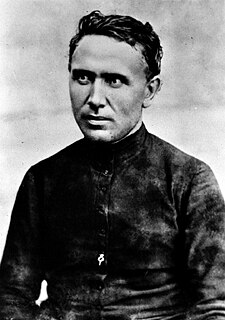Elias is the Latin and Greek equivalent of Elijah, a prophet in Israel in the 9th century BCE, mentioned in several holy books. Due to his prominent role in the scriptures and to many later traditions associated with him, his name is used as personal male name in numerous languages.
De Grootste Nederlander was a public poll held in 2004 by the broadcasting company KRO of the Publieke Omroep. The series has the BBC's 100 Greatest Britons TV format. During the series, it included individual programmes on the top ten, with viewers having further opportunities to vote after each programme.

De Grootste Belg was a 2005 vote conducted by Belgian public TV broadcaster Canvas, public radio broadcaster Radio 1, and newspaper De Standaard, to determine who is the Greatest Belgian of all time. It could be considered as a Flemish list, considering that French-speaking community broadcast RTBF also held a vote, Le plus grand Belge. Nominees needed to have lived between 50 BC and now, between the borders of present-day Belgium. This is because Belgium only gained its independence in 1830, while numerous historical individuals from, for example, the Spanish Netherlands, are considered to be "Belgians".
Johanna is a feminine name, a variant form of Joanna that originated in Latin in the Middle Ages, including an -h- by analogy with the Latin masculine name Johannes. The original Greek form Iōanna lacks a medial /h/ because in Greek /h/ could only occur initially. For more information on the name's origin, see the article on Joanna.
Van is a surname in The Netherlands. van is also a preposition in the Dutch and Afrikaans languages, meaning "of" or "from" depending on the context.
Hans is a Germanic masculine given name in German, Danish, Dutch, Faroese, Norwegian, Icelandic and Swedish-speaking populations. It was originally short for Johannes (John), but is now also recognized as a name in its own right for official purposes. The earliest documented usage was in 1356 in Sweden, 1360 in Norway, and the 14th century in Denmark.
Han is used as a name in many cultures. The Western usage of the name is as a variant of Hans.
Post is a surname of Low German and Dutch origin. It can be either toponymic or occupational. People with the name Post include:
Gerard is a male forename of Proto-Germanic origin, variations of which exist in many Germanic and Romance languages. Like many other early Germanic names, it is dithematic, consisting of two meaningful constituents put together. In this case, those constituents are gari > ger- and -hard.
Meijer is a Dutch surname. It refers to a profession similar to a bailiff or steward. It originates from the Latin word maior and is often rendered Meyer abroad.
The following is a list of notable deaths in 1996. Names are listed under the date of death and not the date it was announced. Names under each date are listed in alphabetical order by family name.
The Dutch male given name Hendrik is a cognate of the English Henry. The spelling Hendrick was interchangeable until the 19th century. Birth names of people with this name can be Latinized to Henderikus, Hendricus, Hendrikus, or Henricus, while common nicknames for Hendrik are Han, Hein, Henk, Hennie, Henny, Henri, Henry, Rijk, and Rik. People with Hendrik or Hendrick as their first name include:
The following is a list of notable deaths in 1997. Names are listed under the date of death and not the date it was announced. Names under each date are listed in alphabetical order by family name.
Henk is a Dutch male given name, originally a short form of Hendrik. It influenced "Hank" which is used in English-speaking countries as a form of "Henry". People named "Henk" include:
This page is based on this
Wikipedia article Text is available under the
CC BY-SA 4.0 license; additional terms may apply.
Images, videos and audio are available under their respective licenses.
